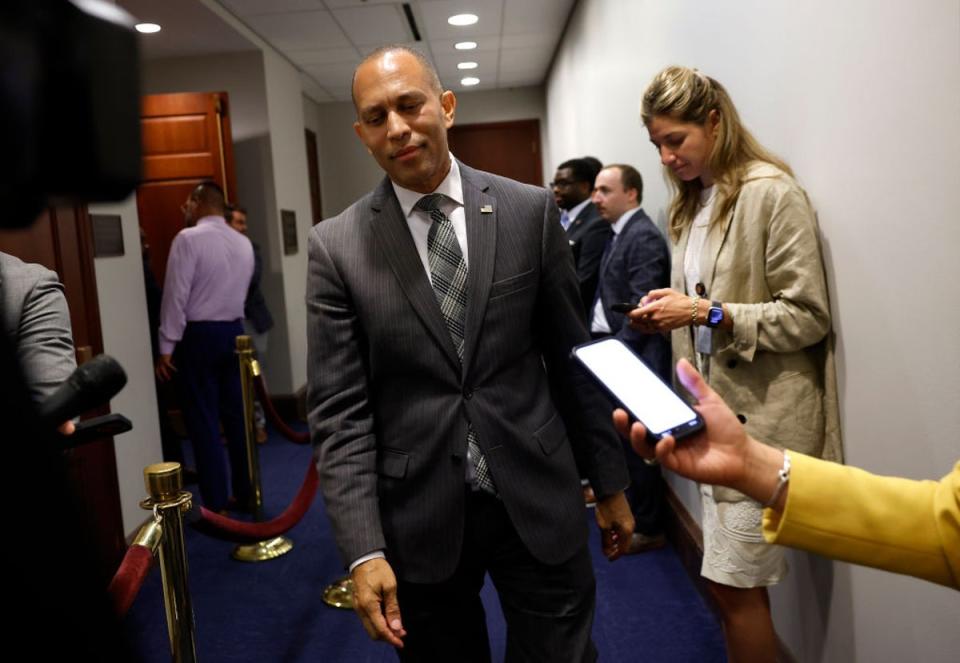‘He has to step down’: Democrats in Congress say mood is grim as a ‘funeral’ as Biden refuses to drop out
There was very little enthusiasm visible from members of President Joe Biden’s party as they continued to trickle back onto Capitol Hill this week for the return of business in the House and Senate.
Congressional Democrats who emerged from meetings on Tuesday indicated two main sentiments to reporters: that Joe Biden would not be getting out of the race; and that no progress has been made in convincing even some of his own supporters that he is up to the task of running for president and serving another four years in the White House.
Even those who have urged Biden to make the hard choice and withdraw from the race — like ranking Judiciary member Jerry Nadler — admitted to reporters on Tuesday that they were at an impasse. The president remains the only one with the ability to release his delegates to the Democratic National Convention (DNC) next month, making the nomination his unless he steps aside.
“The president made very clear yesterday that he’s running,” Nadler told a gaggle of reporters. “We have to support him.”
Nadler added that his concerns about the president’s ability to run an effective campaign were now “beside the point” — in other words, no longer relevant, given Biden’s apparent refusal to listen to those concerns.
But both privately and publicly, the mood remains grim. One member inside today’s House meeting described the mood as "like a funeral” in a comment to Punchbowl News.
Few Democrats are now willing to give an enthusiastic endorsement of the president’s communication or cognitive functions. More are willing to tout his administration’s policy record or resort to a favorite angle of attack: Donald Trump. And there was virtually no consensus among those present in Congress regarding how to move forward — guaranteeing that the party will remain fractured and without a unified message for days to come.
“Are you all on the same page?” one reporter asked Representative Steve Cohen as he left the meeting.
“No,” he replied. When asked by a second journalist what he meant: “We’re not even in the same book.”
Mike Quigley, one of the Biden-must-go’s, exited the gathering and told reporters that the leader of his party would “bring the ticket down” if he ran in November.
“He has to step down,” said the Illinois Democrat.
It remains unclear whether Biden can hold on to his party and manage their discontent long enough to secure the Democratic nomination. The DNC is set to hold a four-day convention in August, where Biden or another Democrat will accept the nomination in front of thousands of supporters, activists, labor leaders and others.
The White House has said that the US president will hold a press conference this week as part of the NATO summit in Washington. For months, he has appeared only at carefully manicured media appearances, apart from occasional comments to journalists on the ropeline as he travels to and from his home in Delaware and other locations.
Biden has not held an extensive press conference in which he takes questions from the majority of the White House press pool in months. He’s held the fewest such media availabilities of any sitting president over the past six administrations.

His performance at the first general election debate of the 2024 election season earlier this month alarmed many, including some who had previously attacked journalists personally for reporting that Biden’s cognitive functions and communication skills were potentially becoming a real issue. During the 90-minute debate, Biden was unable to finish his thoughts coherently at multiple points while speaking with a hoarse, faint voice. He was unable to effectively critique his opponent’s false statements and neglected to bring up major talking points pushed by his campaign, including attacks centered on the Republican policy sphere’s “Project 2025”, a plan by a number of conservatives (including many connected to Trump) to radically reshape the federal government.
Polling shows the incumbent president trailing in every swing state he won against Donald Trump in 2020. That’s a prospect which would mean a clean defeat in the Electoral College.
Thanks to current realities in the House and Senate, a Trump victory in November would likely be accompanied by respective Republican majorities in both chambers of Congress.
